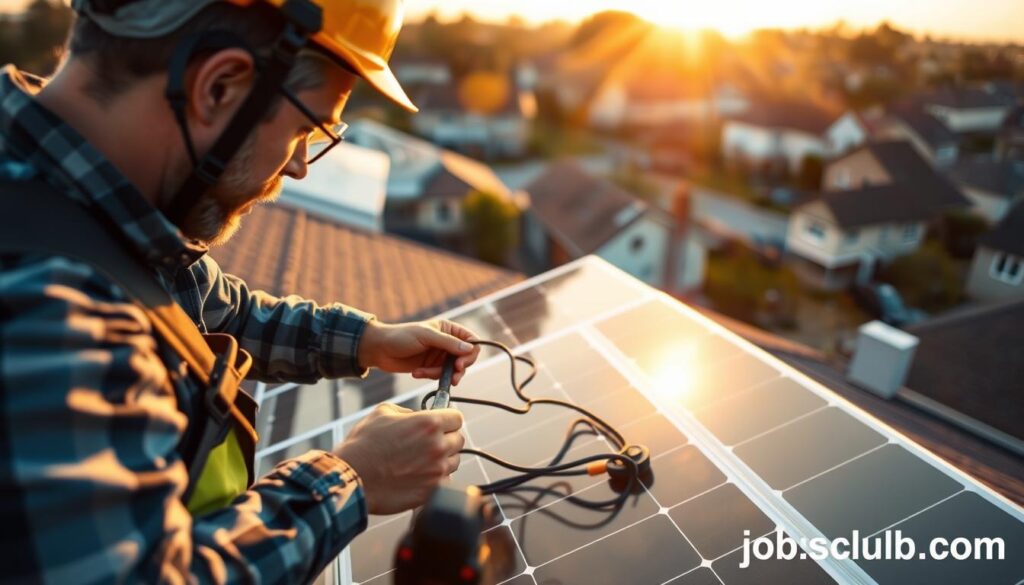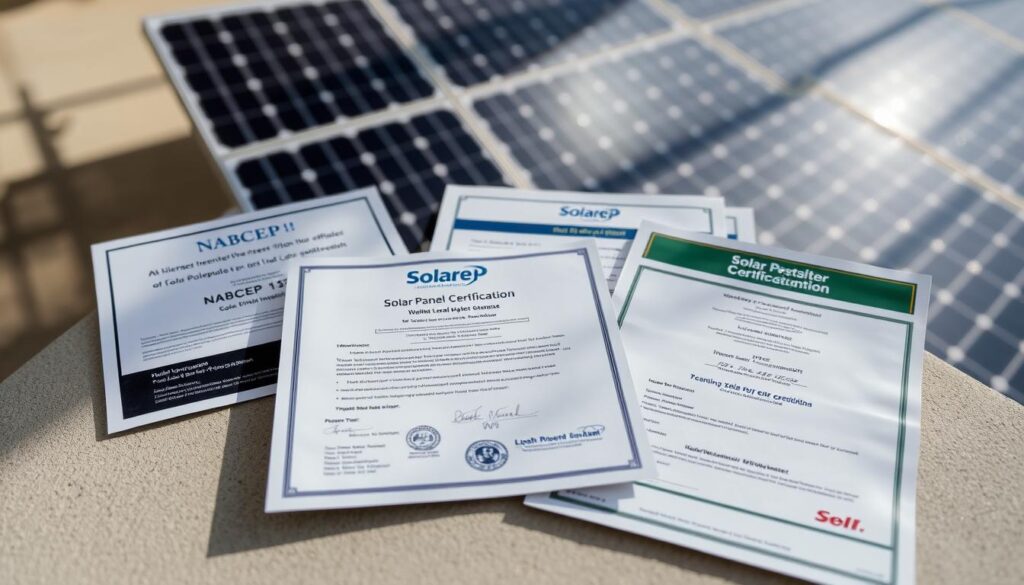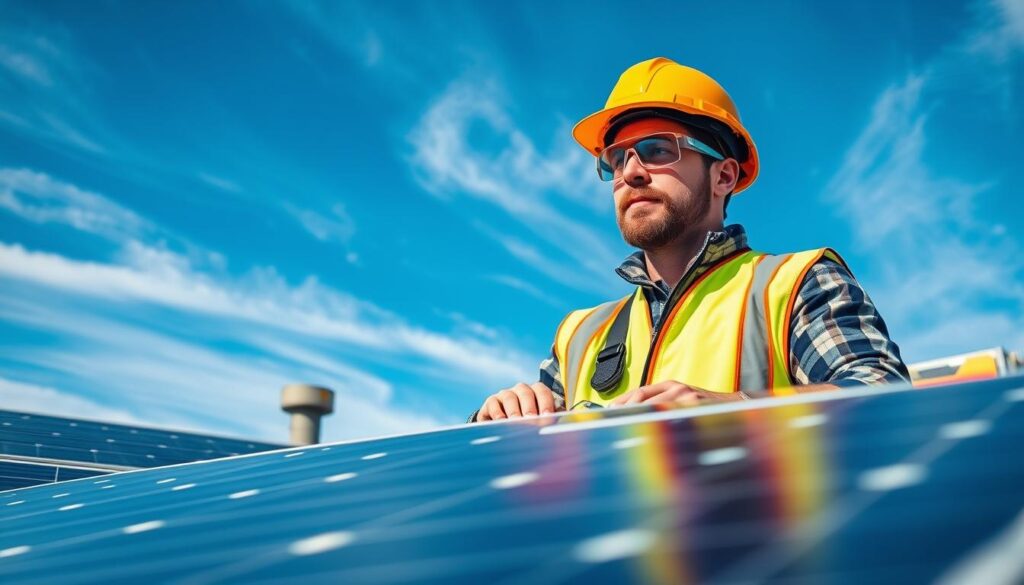Are you looking for a rewarding career that contributes to a sustainable future? Green energy careers are on the rise, and one of the most in-demand roles is that of a solar panel installer.
As the world shifts towards renewable energy sources, the demand for skilled professionals to install and maintain solar energy systems is growing rapidly. This career path is particularly appealing because it doesn’t require a college degree, making it accessible to a wide range of individuals.
You can embark on this fulfilling career by acquiring the necessary skills and training. With the increasing focus on environmental sustainability, solar panel installer jobs offer a promising career trajectory with opportunities for advancement.
Key Takeaways
- Green energy careers are becoming increasingly popular.
- Solar panel installer jobs do not require a college degree.
- The demand for solar energy professionals is on the rise.
- This career path offers opportunities for growth and advancement.
- You can acquire the necessary skills through specialized training programs.
The Rise of Green Energy Careers
As the world shifts towards cleaner energy sources, you might be wondering about the career opportunities emerging in this field. The green energy sector is experiencing rapid growth, driven by the increasing demand for renewable energy sources. This shift is not only beneficial for the environment but also presents a wealth of career opportunities for individuals looking to enter the green energy workforce.
The Growing Demand for Renewable Energy
The demand for renewable energy is on the rise, driven by concerns about climate change and the need for sustainable energy solutions. According to recent data, clean energy careers are growing rapidly, with renewable energy leading the charge. This growth is creating new job opportunities in the green energy sector, making it an exciting time to consider a career in this field.
Why Solar Power Leads the Green Revolution
Solar power is at the forefront of the green revolution, offering a clean and renewable source of energy. The solar industry is experiencing significant growth, driven by advancements in technology and decreasing costs. As a result, solar power is becoming an increasingly viable option for both residential and commercial energy needs, driving the demand for skilled professionals in solar panel installation and related fields.
What Does a Solar Panel Installer Do?
If you’re considering a career as a solar panel installer, it’s essential to understand the daily responsibilities involved. As a solar panel installer, you’ll be responsible for ensuring that solar panel systems are installed correctly and efficiently.
Daily Responsibilities and Tasks
Your daily tasks as a solar panel installer will vary depending on the specific job requirements. However, some common responsibilities include:
- Assessing installation sites to determine the best placement for solar panels
- Installing mounting hardware and electrical wiring
- Connecting solar panels to inverters and other system components
- Testing systems to ensure they’re functioning properly
Residential vs. Commercial Installation Differences
While the core tasks remain the same, there are differences between residential and commercial solar panel installations. Residential installations typically involve smaller systems and more straightforward installation processes. Commercial installations, on the other hand, often require more complex designs and larger system capacities.
Maintenance and Troubleshooting Duties
In addition to installation tasks, solar panel installers may also be responsible for performing routine maintenance and troubleshooting issues with existing systems. This can include:
- Inspecting systems for damage or wear
- Cleaning solar panels to optimize performance
- Diagnosing and repairing electrical or mechanical issues

Work Environment and Conditions
As a solar panel installer, you’ll work in a variety of environments, from residential rooftops to commercial solar farms. The job requires physical stamina, as you’ll be working at heights, lifting equipment, and spending long periods outdoors in various weather conditions.
| Work Environment | Typical Conditions |
|---|---|
| Residential Rooftops | Variable heights, different roof types |
| Commercial Solar Farms | Large, open areas with solar panel arrays |
| Work Sites | Outdoor conditions, potential for extreme weather |
Understanding the work environment and conditions is crucial for success as a solar panel installer. By being aware of the challenges and demands of the job, you can better prepare yourself for a career in this field.
Skills Needed for Success as a Solar Installer
To succeed as a solar installer, you’ll need a unique blend of technical knowledge, physical stamina, and interpersonal skills. As highlighted by Onward Energy, a key player in the renewable energy sector, the skills required for a Solar O&M Tech include technical, physical, and soft skills.
Technical Skills
Technical skills are crucial for a solar installer. You should be familiar with electrical systems and have a basic understanding of photovoltaic technology. Knowledge of local building codes and regulations is also essential. You may acquire these skills through vocational training or certification programs, such as those offered by private company jobs in the renewable energy sector.
Physical Requirements
The job of a solar installer is physically demanding. You need to be comfortable working at heights and have the strength to lift heavy equipment. Good physical stamina is necessary to work efficiently in various weather conditions. It’s also important to have a good level of manual dexterity to handle tools and equipment safely.
Soft Skills That Matter
Soft skills are equally important for success as a solar installer. You need to have good communication skills to interact with clients and team members effectively. Problem-solving skills are also vital for troubleshooting issues on the job. Additionally, being able to work well in a team and having a positive attitude can make a significant difference in your performance and job satisfaction.
Step-by-Step Guide to Becoming a Solar Panel Installer
Embarking on a career as a solar panel installer is a straightforward process that can be broken down into manageable steps. You can start by understanding the requirements and gradually build your skills and knowledge.
Step1: Research and Self-Assessment
Begin by researching the role of a solar panel installer. Understand the daily tasks, work environment, and required skills. Assess your own strengths and weaknesses to determine if this career path aligns with your abilities and interests.
Step2: Complete Basic Training
Enroll in a basic training program for solar panel installation. These programs are usually offered by vocational schools or community colleges and cover fundamental concepts and safety protocols. Hands-on training is a crucial aspect of these programs.
Step3: Gain Hands-On Experience
Gain practical experience by working under the supervision of experienced installers. This step is vital for understanding the real-world application of your training and developing your skills further.
Step4: Obtain Necessary Certifications
Certifications such as NABCEP (North American Board of Certified Energy Practitioners) are highly regarded in the industry. Obtain these certifications to enhance your job prospects and demonstrate your expertise.
Step5: Apply for Entry-Level Positions
With training and certifications in hand, you’re ready to apply for entry-level solar panel installer positions. Tailor your resume to highlight your relevant training and experience, and be prepared for interviews by practicing your responses to common questions.
By following these steps, you can successfully launch your career as a solar panel installer.
Training Paths for Solar Panel Installers
As you embark on your journey to become a solar panel installer, you’ll need to explore the various training paths available to you. The solar industry offers multiple entry points for newcomers, ensuring that you can find a training method that suits your learning style and career goals.
Vocational Programs and Certifications
Vocational programs are an excellent way to gain hands-on experience and technical knowledge. Many community colleges and technical schools offer solar panel installation courses that can be completed in a few months to a year. These programs often include certifications, such as the North American Board of Certified Energy Practitioners (NABCEP) certification, which can significantly boost your employability.
On-the-Job Training Opportunities
On-the-job training is another valuable path to becoming a solar panel installer. Many companies in the solar industry offer apprenticeships or entry-level positions that allow you to learn while working. This hands-on experience is invaluable, as it exposes you to real-world installation scenarios and helps you develop practical skills.
Self-Study Resources and Online Courses
For those who prefer self-paced learning, online courses and self-study resources are readily available. Websites like Udemy, Coursera, and edX offer courses on solar energy and installation techniques. Additionally, many industry organizations provide study materials and training guides that can be used for self-study.
| Training Path | Duration | Cost |
|---|---|---|
| Vocational Programs | 6-12 months | $3,000-$10,000 |
| On-the-Job Training | 6-24 months | $0 (paid apprenticeship) |
| Online Courses | 1-6 months | $100-$1,000 |
Essential Certifications for Solar Panel Installers
As you pursue a career as a solar panel installer, obtaining the right certifications is crucial for your success. Certifications not only enhance your knowledge and skills but also make you more attractive to potential employers. In the solar industry, certifications can be a key differentiator, setting you apart from others in the field.

NABCEP Certification Process
The North American Board of Certified Energy Practitioners (NABCEP) is a well-respected organization that offers certifications for solar panel installers. The NABCEP certification process is designed to ensure that professionals in the solar industry have the necessary skills and knowledge to perform their jobs effectively.
Entry Level Exam Requirements
To begin the NABCEP certification process, you’ll need to meet the entry-level exam requirements. This typically involves completing a training program approved by NABCEP or having relevant work experience. The entry-level exam tests your understanding of solar panel installation principles, safety protocols, and industry standards.
Advanced Certification Pathways
After gaining experience and passing the entry-level exam, you can pursue advanced certification pathways. These advanced certifications demonstrate your expertise in specific areas of solar panel installation and can lead to higher-paying job opportunities and greater career advancement.
Other Valuable Industry Certifications
While NABCEP certification is highly regarded, other certifications can also be valuable in the solar industry. For example, OSHA (Occupational Safety and Health Administration) certification can demonstrate your commitment to safety on the job site. Additionally, manufacturer-specific certifications can show that you’re trained to install and maintain specific solar panel systems.
Tools and Equipment You’ll Need to Master
Becoming proficient in the right tools and equipment is crucial for a career as a solar panel installer. As you prepare for this role, you’ll need to familiarize yourself with a variety of tools that are essential for installing solar panel systems efficiently and safely.
Hand Tools for Installation
Solar panel installers use a range of hand tools to complete their work. These include:
- Wrenches and sockets for mounting hardware
- Drills and bits for making holes and driving screws
- Cutters and strippers for working with electrical cables
- Levels and plumb bobs for ensuring accurate alignment
- Tape measures and chalk lines for measuring and marking surfaces
Safety Equipment Requirements
Safety is paramount in solar panel installation. You’ll need to use appropriate safety equipment to protect yourself from hazards on the job. This includes:
| Safety Equipment | Purpose |
|---|---|
| Hard hats | Protect against falling objects |
| Safety glasses | Protect eyes from debris |
| Harnesses and lanyards | Prevent falls from heights |
| Gloves | Protect hands from cuts and abrasions |
By mastering these tools and safety equipment, you’ll be well-prepared to succeed as a solar panel installer.
Solar Panel Installer Jobs: Salary and Job Outlook
If you’re looking into a career in solar panel installation, you’re probably wondering about the financial prospects. The solar industry is rapidly expanding, and with it, the demand for skilled solar panel installers is on the rise.
Average Pay Rates Across the United States
The average salary for solar panel installers in the United States varies based on factors like location, experience, and employer. According to recent data, the median annual salary is around $46,000. However, experienced installers can earn upwards of $70,000 or more.
- In California, the average salary is around $52,000.
- In Texas, it’s approximately $45,000.
- In New York, solar panel installers can earn about $50,000 on average.
Growth Projections for the Next Decade
The job outlook for solar panel installers is extremely positive, with the Bureau of Labor Statistics projecting a 69% growth in employment opportunities from 2020 to 2030. This growth is driven by the increasing demand for renewable energy sources and government incentives for solar energy adoption.
Some key factors contributing to this growth include:
- Increasing demand for solar energy.
- Government policies supporting renewable energy.
- Technological advancements in solar panel efficiency.
Factors That Affect Your Earning Potential
Several factors can influence your earning potential as a solar panel installer, including:
- Experience: More experienced installers can command higher salaries.
- Certifications: Holding certifications like NABCEP can boost your earning potential.
- Location: Areas with high demand for solar installations tend to offer higher pay.

Safety Considerations and Challenges
As a solar panel installer, you’ll face various safety challenges that require careful attention and adherence to strict protocols. Ensuring your safety and the safety of others on the job site is paramount.
Rooftop Safety Protocols
Working on rooftops is a significant part of being a solar panel installer. To mitigate risks, you must follow rooftop safety protocols, including using proper fall protection equipment and ensuring secure ladder placement. Regular safety training helps you stay aware of potential hazards.
Electrical Safety Essentials
Electrical safety is critical when working with solar panel systems. You need to understand how to safely handle electrical components and follow lockout/tagout procedures to prevent electrical shock. Proper training in electrical safety essentials is vital for your protection.
Weather and Environmental Challenges
Solar panel installers often work outdoors, exposing them to various weather conditions. You must be prepared to work in different environments and understand how weather affects your work. This includes being aware of weather-related hazards like lightning storms or extreme temperatures.
Career Advancement Opportunities
As you gain experience as a solar panel installer, you’ll discover numerous paths for career advancement. The solar industry is rapidly evolving, and your skills are in high demand. With the right training and experience, you can move into specialized roles, take on leadership positions, or even start your own business.
Moving Into Specialized Installation Roles
Specializing in a particular type of solar installation can boost your career. You might focus on residential installations, commercial projects, or even solar farms. Each area requires unique skills and knowledge, and specializing can make you more attractive to employers and clients.
- Residential solar installation
- Commercial solar installation
- Solar farm installation
Supervisory and Management Positions
With experience, you can move into supervisory or management roles. These positions involve overseeing installation projects, managing teams, and ensuring that work is completed on time and within budget. Your technical expertise and leadership skills will be invaluable in these roles.
| Position | Average Salary | Key Responsibilities |
|---|---|---|
| Installation Supervisor | $65,000/year | Oversees installation projects, manages teams |
| Operations Manager | $80,000/year | Manages day-to-day operations, ensures project timelines are met |
Starting Your Own Solar Installation Business
For the entrepreneurial-minded, starting your own solar installation business is a viable career advancement opportunity. This path requires not only technical knowledge but also business acumen. You’ll need to navigate licensing, marketing, and financial management to succeed.
By exploring these career advancement opportunities, you can build a fulfilling and successful career as a solar panel installer. Whether you choose to specialize, lead, or innovate, the solar industry offers a bright future.
Conclusion: Powering Your Future in Solar Energy
You now have a clear understanding of how to embark on a rewarding solar energy career without needing a college degree. The demand for skilled solar panel installers continues to grow, driven by the increasing adoption of renewable energy sources. By following the steps outlined in this article, you can position yourself for success in this exciting field.
As you consider this career path, remember that green energy careers with no college required offer not only financial stability but also the satisfaction of contributing to a sustainable future. With the right training and certifications, you can access a wide range of opportunities in the solar industry.
Take the first step today by researching local training programs and exploring entry-level positions. Your future in solar energy is waiting – seize it and become part of the clean energy revolution.